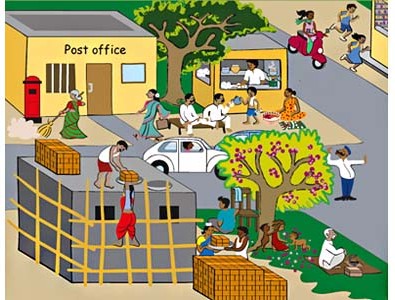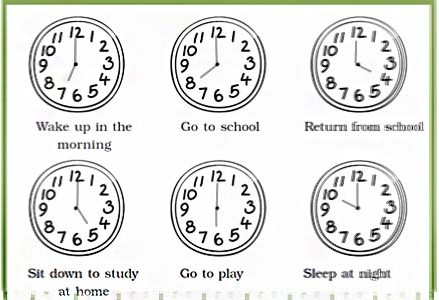(i) Students learn different things.
(ii) Teachers teach the students and motivate them.
(iii) The Principal manages the school.
(iv)The Librarian maintains the school library and monitors the lending of books.
(v) The cleaning staff keeps the school premises neat and clean
NCERT Solutions for Class 3 EVS Chapter 12: Work We Do
Class 3 EVS Chapter 12 tries to capture the essence of the different types of work people do to sustain and this has been described through a scene of the weekly bazaar. The characters of Balbir, Satvinder, Jaggu Bhai, Champa, and others show the diversity in professions.. The chapter also showcases the significance of work done in particular buildings like post offices, hospitals, banks, colleges, police stations, etc. The general idea of household work and how everyone should contribute to it are mentioned in the chapter. In CBSE Class 3 EVS Chapter 12, children also get to know that not everyone gets a chance to attend school, instead, they start working from a young age. The NCERT textbook (Looking Around) questions are answered in a simple and engaging manner. We also have related ‘Learning Concepts’, and interactive worksheets with solutions. Our ‘Learning Beyond’ segment caters to all the probable questions that the child might think out of curiosity. Download Chapter 12 Work We Do in the PDF format for free.
Download PDF For NCERT Solutions for EVS Work We Do
The NCERT Solutions for Class 3 EVS Chapter 12: Work We Do are tailored to help the students master the concepts that are key to success in their classrooms. The solutions given in the PDF are developed by experts and correlate with the CBSE syllabus of 2025-2026. These solutions provide thorough explanations with a step-by-step approach to solving problems. Students can easily get a hold of the subject and learn the basics with a deeper understanding. Additionally, they can practice better, be confident, and perform well in their examinations with the support of this PDF.
Download PDF
Access Answers to NCERT Solutions for Class 3 EVS Chapter 12: Work We Do
Students can access the NCERT Solutions for Class 3 EVS Chapter 12: Work We Do. Curated by experts according to the CBSE syllabus for 2025–2026, these step-by-step solutions make EVS much easier to understand and learn for the students. These solutions can be used in practice by students to attain skills in solving problems, reinforce important learning objectives, and be well-prepared for tests.
Work We Do
In the picture you saw many people work together to build a new building. School is also one such place where many people work.
Write what work is done in the school.
__________. _______________, ___________, _____________.
Are there any children in the picture who are not going to school? What are they doing?
Some children in the picture are not going to the school; instead, one boy is serving tea, a girl is helping her father with his cart, and some kids are playing under the tree.
Write the names of any five buildings and the work done in them.
| Name of the Building | Work Done |
| Name of the Building | Work Done |
| Hospital | Treatment of patients, Vaccination of children |
| Bank | Withdrawal and deposit of money |
| College | Providing education to students |
| Restaurant | Providing delicious food |
| Museum | Storing objects of the past |
| Jewellery shop | Sell jewellery |
[Students should mention their experience based on the above lines.]
What kind of work do people in your neighbourhood do? Name any five. What are these workers called?
| Work | What they are called |
| Work | What they are called |
| Repair cars and scooters | Mechanic |
| Sweeps the roads | Sweeper |
| Sells vegetables | Vegetable vendor |
| Tells the fortune | Astrologer |
| Teaches dance | Dance master/instructor |
| Sells goods in the shop | Shopkeeper |
Look carefully at the picture and write what work is being done by different people.
_20250424_151911.jpeg)
In the first picture—
(i) A woman is sweeping outside the post office.
(ii) A kid from Balbir’s stall is giving tea to the customers.
(iii) A flower seller is sitting beside the road.
(iv) A girl is riding a scooter.
(v) Students are running towards the school.
(vi) Workers are building a house.
(vii) A barber is doing his business under the tree.
(viii) A traffic constable is managing the traffic.
In the second picture—
(i) A shop owner is waiting for the customers.
(ii) A doctor is going to the clinic.
(iii) A boy is riding a bicycle.
(iv) A fruit vendor is selling watermelons on a pushcart along with his daughter.
(v) A woman is carrying goods on her cart towed by a camel.
(vi) Kids are entering the school.
(vii) Cars and a bullock are on the road.
In the picture on the first page of this lesson, some buildings have been shown. In the list below put a red![]() on the names of these buildings. Also, put a green or yellow
on the names of these buildings. Also, put a green or yellow ![]() on the names of those buildings that are in your neighbourhood.
on the names of those buildings that are in your neighbourhood._20250424_152049.jpeg)
_20250424_152149.jpeg)
Household Work
What work does Deepali do in her own house?
______________ _______________ ___________________
______________ _______________ ___________________
Deepali does the following work—
(i) Preparing food for her siblings.
(ii) Taking care of the house.
(iii) Cleaning the utensils.
(iv) She carries her brother to her father and then drops her sisters in the school.
(v) She helps her mother in her work also.
(vi) Deepali then brings her siblings back home from her father and school.
(vii) At night, she then reads her sister’s school books.
Which of your family members do household work?
What work do they do?
| Family Members | Work They Do |
| Family Members | Work They Do |
| Mother | Cooking food, cleaning the house |
| Father | Cooking food, ironing clothes, keeping the drawing-room neat and clean |
| Grandmother | Cleaning vegetables, folding the clothes |
| Grandfather | Bringing milk and newspaper from the main gate, watering the plants in the garden |
| Brother | Keeping study room neat and clean, helping mother and grandmother in their work |
[Students should mention their experience based on the above lines.]
Which of your family members do work but do not get money for it?
My mother does most of the household work but does not get paid for it. My brother and grandparents also help around the house without getting money.
[Students should mention their experience based on the above lines.]
Find out from your grandparents what work they did when they were children.
My grandmother used to accompany her mother in cooking and household work when she was my age. My grandfather, when he was a child, used to collect dry timber for lighting the chullha. He also used to milk a cow in the morning.
[Students should mention their experience based on the above lines.]
You had written about the work you do and the work done by your elders in their childhood. Is there a change?
Yes, there is a change between the work the elders did when they were young and the work I do now. They had so much work to do in and around their houses as they had a large family. I do quite less work than my grandparents did.
[Students should mention their experience based on the above lines.]
Which of your family members work to earn money?
| Family Members | Work They Do |
| Family Members | Work They Do |
| Mother | Teaches in a primary school |
| Father | Works in an engineering firm |
| Grandfather | Runs a publishing business |
[Students should mention their experience based on the above lines.]
Talk to any two children and find out why they do not go to school
| Name of the first child | ______________ |
| Reason for not going to school | ______________ |
| Name of the second child | ______________ |
| Reason for not going to school | ______________ |
| Name of the first child | Sahil Patel |
| Reason for not going to school | Sahil’s father has lost his job, so Sahil has to work in a garage to help his family. |
| Name of the second child | Meera Roy |
| Reason for not going to school | Meera Roy |
[Students should mention their experience based on the above lines.]
Besides household work do you do any other work at home? If yes, what?
Besides household work, I neatly fold my clothes every day after they are washed and dried.
[Students should mention their experience based on the above lines.]
Do you also do household work? If yes, what?
___________, ______________, ___________
___________, ______________, ___________.
Yes, I also do some household work, like—
(i) I go to the nearby shop to bring whatever my mother needs.
(ii) I serve water to the guest.
(iii) I water the plants daily.
[Students should mention their experience based on the above lines.]
Deepali had to leave school to do household work. Find out if there are any children in your neighbourhood who are over five years and do not go to school.
Yes, our school bus driver’s children do not go to school. My mother always asks him to send his children to school.
[Students should mention their experience based on the above lines.]
Given below are some daily activities. Show on the face of the clocks, at what time of the day you do them.
_20250424_153153.jpeg)
I wake up at 7 o’clock, go to school at 8 o’clock, return from school at 4 o’clock, then start to do my homework at around 5 o’clock, go out to play at 6 o’clock, go to bed at 9 o’clock.
[Students should mention their experience based on the above lines.]

